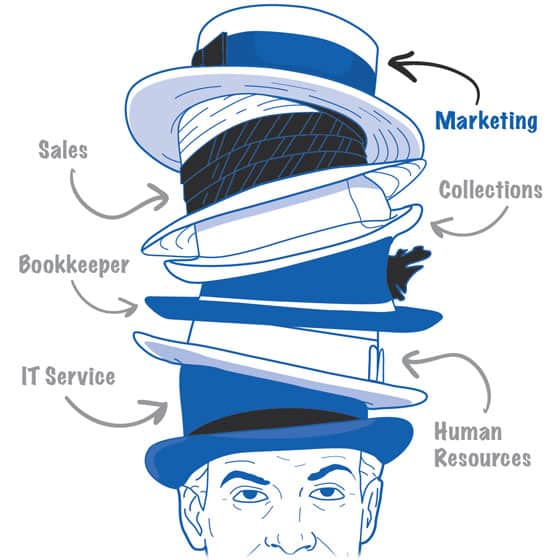
There IS Such a Thing as Wearing Too Many Hats
Learn How to Determine If and When a Company Should Outsource
If you own a small business, chances are you’ve often heard it said that you “wear many hats.” But what exactly does this mean?
In a larger company, those in senior positions or members of the senior management team make up the C-Suite. The C-Suite, or C-Level, gets its name from the titles of top executives that start with the letter “C” for “Chief”. These are the people who possess the expertise and leadership skills to manage and grow a company. They include:
Chief Executive Officer (CEO) – The highest-level executive, responsible for setting the strategy and direction for the company to achieve its vision. The CEO relies on other C-suite members for advice on making major decisions.
Chief Financial Officer (CFO) – Has a global mindset and works closely with the CEO to find new business opportunities, while weighing the financial risk and benefits of each potential venture.
Chief Operating Officer (COO) – Manages the operations of a company, ensuring that it functions smoothly in areas such as human resources, legal, and administration.
Chief Information Officer (CIO)/ Chief Technology Officer (CTO) – A leader in information technology who applies this expertise to risk management, business strategy, and finance.
Chief Marketing Officer (CMO) – Manages social innovation and product development across brick-and-mortar and electronic platforms.
Small business owners often start out with limited resources and take on all of these roles and responsibilities themselves. As the business grows and your workload increases, it becomes increasingly difficult to wear so many hats. And if you fail to delegate responsibility and stretch yourself too thin, your business will suffer as a result.
Successful entrepreneurs know when it’s time to hire help to address the evolving needs of their business.
If it’s not realistic or cost-effective to bring on full-time professionals, there are strategic advantages to tapping the skills of independent contractors or outside agencies to tackle critical tasks.
To help determine if outsourcing is a logical next step for your company, consider the following:
Does the task directly generate profits? If so, it’s probably not a good idea to outsource.
Do you need someone with a specialized skill set? This is a good place to outsource.
Is the task seasonal or cyclical? For instance, you might have only one or two major marketing campaigns a year that require a good deal of support. If so, outsourcing is a great option.
Is the task routine or a commodity that wastes in-office resources? Outsource it to an individual or agency that can do it more efficiently.
Is the cost to outsource the service less than what it would take in time and manpower to do it in-house? Many small businesses find it more affordable to outsource functions like IT, accounting, staffing, and payroll.


